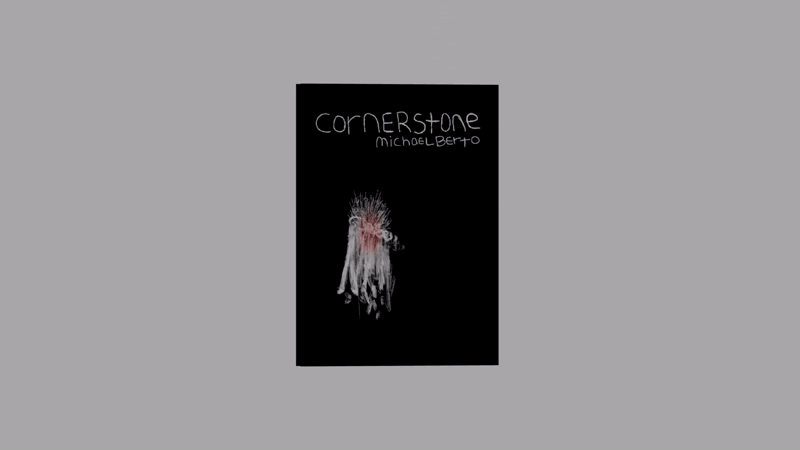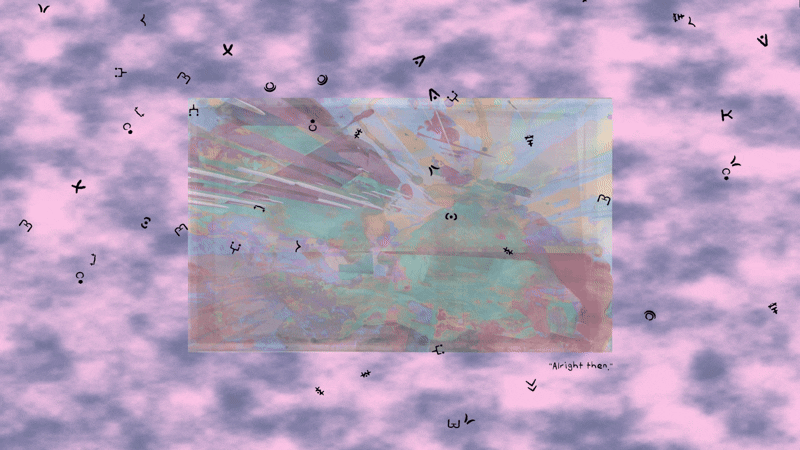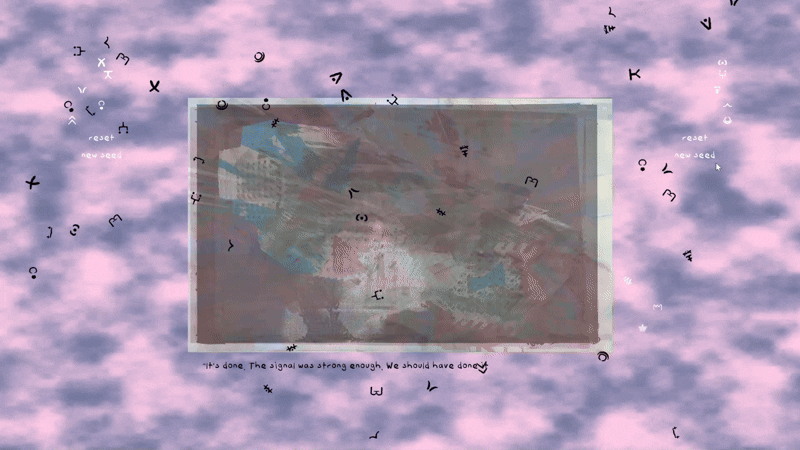Cornerstone
Hello everyone,
Today I am releasing a novella. It is called Cornerstone.
Cornerstone is not the first thing I have ever written, but it is the first thing approaching some kind of piece of some kind of literature that I have ever put into the world. Aside from poetry, my narrative work in the games industry and some other more mysterious forms of fiction, of course. Cornerstone means a lot to me and I am very, very proud of it. Very happy with it. In love with it. I hope you'll read it.

I would now like to share an anecdote.
You see, I have been writing since they put a pencil in my hand and taught me the alphabet. Probably before that, in some metaphysical, 'daydreaming is writing' sort of way. You see, there was a day that my kindergarten teacher established to me that the negative space within an O should in fact not be coloured in. This was an affectation to my early-life penmanship. I recall one evening as a five year old, doing my homework, and as my mother watched me do my homework, and as I began to colour-in the negative space of an O, my mother she asked me "are you sure that's ok?" and to this I said "yeah, it's fine".
I meant it. In my mind, my kindergarten teacher would allow this, and I had every confidence in that belief. My teacher would assuredly understand that what I am doing was a form of self expression. In that moment as an approximately five year old child in kindergarten, I believed that the process of learning how to write, and how to write the alphabet, was a true collaboration between teacher and student, and in turn, open to interpretation. The next day at school, it is safe to say that my kindergarten teacher totally over-reacted to the fact that all throughout my homework, my O's had been coloured-in. I accepted the reaction. I also somehow had the preconceived insight that it was also possible she would not be O.K. with me colouring in my O's. I had gone against the form, however, freely, innocently, and not as a point of defiance, in my defence. In any case, it was the last time I really ever allowed any mortal person to tell me how to write something that I wanted to write in a certain way. That is to say that I no longer colour in the negative space of an O, however, I do believe that in some emotional and metaphysical way I still do at every opportunity. I think in a different context, I could make the case for this being evidential of the artist archetype within me, and in a very abstract way, the source of my life as a composer, but this is an abstraction for another time, as today we focus on the writer neurons. This was not the anecdote, by the way, this is the foundational preamble to the anecdote, which is this;
When I decided to start trying to make games, I was very inspired by an artist and developer named Pippin Barr. I emailed Pippin Barr as a stranger many years ago, and I have emailed Pippin Barr many times over the years since then, usually at the advent of some creative endeavour I am about to, or have just, embarked upon. Pippin has become a very kind and encouraging sort of figure in my life. This is the anecdote happening now, by the way.
It was during a recent to the current day correspondence with Pippin Barr that I mentioned that I was getting close to feeling ready to release some bundled and packaged prose, and Pippin, a collaborator and creative person who has been intimately aware, and in some cases involved, in much of my artistic output over the years, said; "You're a writer?!" ~ it was this comment that really solidified that I really should release some of my writing to the world and do the equivalent of erecting a billboard above my metaphorical house that says "Writer" on it, because that's how I see myself when I look in the mirror. I am a house with a billboard above it that says "Writer". There are other billboards up there, the "Artist" one keeps getting bigger and bigger, but the "Writer" one I always keep visible from street level in the conception of myself to myself, on the street of myself, in the suburb of myself. There is always music coming from my house.
The anecdote has concluded. Thank you.
------------------
One accidental and coincidental thing about Cornerstone becoming the first work I release in this way is that it naturally feels like a good primer to the kind of writing that I enjoy to read and to write. It also feels like I can bring to you something that isn't like anything else you've read, in a very specific and perhaps even a broadly general way. Certainly in a literal way as if you haven't read Cornerstone before, you have never read anything like it. I feel while some may call its form unconventional, I feel it represents everything that it should. Anyone can write a novel, not everyone can write Cornerstone. It represents a style that I feel suits me, and suits the reading experience that I wanted to offer, the story that wanted to be told, in the way it wanted to be told. Something pocket-sized, something short but something, hopefully, with something within it approaching an infinite depth. A kind of writing that develops uniquely after writing conventionally for most of one's life.
Cornerstone is a piece of writing that had been begging to be released since it hit the page. It begged for an audience, it begged to be read. It is that kind of self-thinking kind of story. Over the years, it has had various iterations and additions, but this process always felt the better when the aggregate text got smaller, not larger in word count. I wrestled with this. I wrestled with the idea that a "book" must be "a certain way" to be classified " a book" and while I revere and respect the form factor and institutional format of a novel, I though that this life being my own, and my artistic output being on my terms, that I did not have to follow an arbitrary rule to tell a story in a way that it demanded to be told. I say this in the face of what awaits you in Cornerstone, and hopefully, in hindsight or otherwise, answers some kind of some kind of question you might have after reading it. To which I will pre-empt you by saying "yes, it's meant to be like that" and I will pre-empt an encourage you to understand that "it is intended to be read cover to cover as it is presented, and preferably only once."
I have coloured in the negative space of an O, of every O in the text, metaphorically and metaphysically. It is a story, I feel, only i could write, and a story that, unfortunately, or perhaps fortunately, that only I can tell.
I do not want to speak about the content of Cornerstone other than to present you with the only blurb that should ever be associated with it; it is a story about construction.
------------------
As a companion piece to Cornerstone, I am also releasing a companion application, and the second endless, non-linear orchestration that I have released. The first of those being The Geography. This one is called Ophiuchus. An endless, re-generating, constantly re-configuring and evolving ambient audio-visual composition. It is a free companion for those who purchase Cornerstone, and also free for those who do not purchase Cornerstone.
To me, there seems to be great ebbs and flows to the zeitgeist of creation. There is innovation, and then from that innovation both refinement and repetition until the next innovation. In all genre, in all mediums, we experience this. I find the most electrifying and exciting work comes at the nexus of high refinement and innovation. I see this happening in all mediums, but mostly in games, and by extension, software. Software itself, as an artistic medium, is an almost perfect expressive art form. There is innovation beneath the visible result of software. Tethering not only to code or engines, but computers themselves, as they evolve, so does software. The same thing happens conceptually, in conceptual thinking, in the evolution of storytelling and the ways we story-tell. With Ophiuchus, and other experiments like it, I enjoy manifesting things from the grey area between ebook and video game as a narrative medium. That is what Ophiuchus is, a kind of ebook, but more broadly, an alternate way to experience the text in an emergent context. Ophiuchus as a companion to Cornerstone gives you the full Cornerstone text but as a totally transformed experience, that stands totally independently to the reading experience. At the same time, we enable a kind of biological-metric of emotional and subconscious synchronization with a feeling that was crafted to compliment and enhance the text of Cornerstone.

For Ophiuchus, I worked with an artist that I have become very inspired by and proud to call a multi-collaborator and friend, by the name of Jacob Potterfield. You see, it is somewhat important to not give any sort of "overt" imagery, themes or otherwise context about Cornerstone to those who intend to read Cornerstone for the first time. The cover itself is a good example of how the abstract image marries to Cornerstone in so much as there exists an adherence to the notion mentioned above of "no overt imagery." However, there was something about Jacob's work that made me feel like "if I were to endorse some kind of 'official art' to compliment Cornerstone, I can imagine it being something like this." So, I mentioned this to Jacob, and then he sent me some paintings. Ophiuchus came together pretty quickly after that.
Now, the cover of the novella is my doing, I drew that one, but the art within the application is all Jacobs. Aside from the little icons, of course. The central focal point of the visual experience are composed of Jacob's paintings. They are paintings, layers of paintings, that like the layers of music, are constantly re-combining into a new visual compositions, also endlessly re-inventing itself together with the music. The piece is a true generative piece of art, in the classical, Eno-esque sense of the word generative.
It is as tender and special to me as Cornerstone itself. It is a real pleasure and great fortune that we were able to put it together in a relatively short amount of time, and to be able to offer something that could be considered a "vibe calibrator" for your reading experience, and beyond that, your life. Being an 'endless non-linear orchestration' it is made in the spirit of an endless musical ambient composition, so something that could feasibly be put on in the background to get you into a certain mood. To calibrate it to you, too.
Ophiuchus contains some experimental mechanisms and mechanics that The Geography was a little light on, but still included in some way. In Ophiuchus, there is an optional 'abstract controller' that will allow a user to customise the trajectory of both the musical and visual the composition of the piece. By default, the piece will play as orchestrated and designed by me, and while you can tinker with the parameters, you can also simply 'reset' them to return to the intended piece, if you find yourself in some strange audio-visual place that does not suit you.
The text of Cornerstone is also within this application, however is delivered to the observer one line at a time, and out of order. If you would like to read Cornerstone in its intended format and order, please consider supporting me and the novella by purchasing a copy, either here on itch.io or via amazon (where there are also physical paperbacks available for purchase.)
------------------
I can also announce that the aforementioned Pippin Barr will be making a video game using the text of Cornerstone as source material, and I am very excited about it. A delight for us all, I'm sure. You can learn more about that by paying Pippin a visit on the internet.
------------------
Thank you for reading, and if you're familiar with any of my work at all, thank you for focusing the lens of your consciousness on my corner of the universe. I hope you will read Cornerstone, and I hope you will enjoy Ophiuchus.
All the best,
Michael.


Comments
Log in with itch.io to leave a comment.
book was fire dude. hard to follow but cool coz its like. thats obviously the point. and the imagery and all that was pretty great. also the game thing was a cool bonus and got me to buy the book so nice job